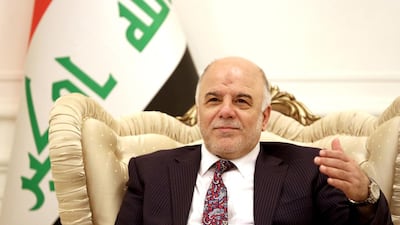Despite the threat posed by ISIL, the real danger to Haider Al Abadi’s authority lies within Iraq’s political scene. The layers of conflicting interests and disputes that have been built up over the past decade are considerable and will test the Iraqi prime minister considerably.
In Washington, the conventional narrative is that Mr Al Abadi is the antithesis to Nouri Al Maliki, his predecessor – committed to stamping out corruption within Iraq’s institutions and redirecting the country’s strategic orientation closer to the US, while also planning to mend Baghdad’s relations with the Arab world and integrate Sunni and Kurdish factions into an inclusive government.
In many ways, Mr Al Abadi’s actions reflect the hopeful expectations that the West have for him. Over the past month, he has sacked 50 senior officials from Iraq’s military and security institutions. Earlier this month, he announced that Iraq allegedly paid up to 50,000 “ghost” soldiers a month and said he would challenge those benefiting from a corrupt system. “I am moving forward with reform to expose [ghost soldiers],” he said. “Campaigns were launched to topple me ... However, I will not back off, even if [this] leads to my assassination.”
Purges within the security forces were inevitable, but more importantly, have less to do with fighting corruption itself and more to do with Mr Al Abadi imposing his own style on the system.
Despite Mr Al Abadi and Mr Al Maliki coming from the same Shia Islamist party, the new Iraqi leader was always unlikely to allow the security architecture of his predecessor to remain intact. To do so would compromise his political future. In addition, Mr Al Abadi has openly pleaded for increased security assistance from the US, in the form of more air strikes against ISIL and more military resources supplied to Baghdad.
While Washington may view the prime minister’s calls for more western military engagement as a desire to see greater American influence, one should not interpret it that way.
For Mr Al Abadi, the underlying rationale is driven by concerns over his own political survival. Indeed, just as the US military’s presence served to secure Mr Al Maliki’s Iraq, the current prime minister hopes to piggyback off the growing US presence to help deepen his staying power, thus reducing his level of dependency.
Some in the Sunni Arab political elite are beginning to see Mr Al Abadi as someone too weak to deliver on his promises.
“Just talk,” one senior Sunni Arab politician described the new prime minister. “He makes promises to us like Maliki did, but nothing happens.”
The lack of movement in a law to establish a Regional National Guard – a force made up of local Sunni Arab tribal fighters to combat ISIL in Sunni-dominated territories – is one of many political issues that the prime minister must balance on sectarian fault lines.
Recently his weakness was on display when Iraq’s judiciary delivered death sentences to Sunni Arabs arrested on counterterrorism charges. The court condemned a former member of parliament to death, a move which outraged many Sunnis, who claim the counterterrorism law has been used to marginalise them.
“Iraq’s judiciary is still handing down convictions in politicised trials, fraught with legal irregularities,” said Joe Stork, deputy director of Middle East and North Africa at Human Rights Watch.
Mr Al Abadi’s path to securing his position may come through implementing reforms that increase his control and building an infrastructure that is loyal to him. To satisfy Sunni and Kurdish demands, the prime minister needs to devolve Baghdad’s power. However, he is not yet powerful enough to make such concessions.
While the West hopes that Mr Al Abadi shapes Iraq, it may be the case that over time Iraq will shape him. To be certain, the same structural and systemic features that have characterised post-Saddam Iraq remain intact. The constraints that undermine compromise and the incentives to maximise power have not followed Mr Al Maliki through the exit doors. They remain forces that Mr Al Abadi recognises he must deal with, especially if he wishes to survive in Iraq’s complex political situation.
Ramzy Mardini is a non-resident fellow at the Rafik Hariri Center for the Middle East

